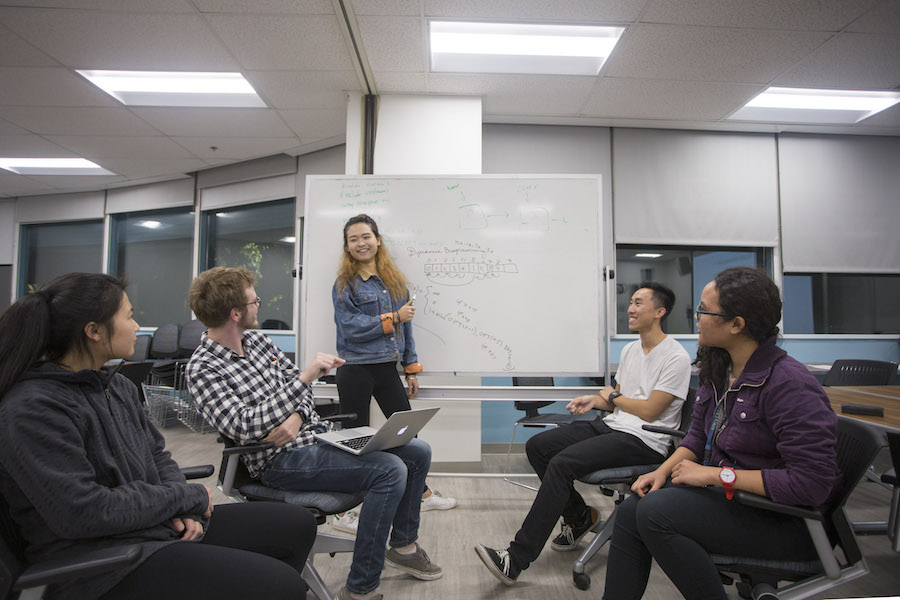
Only 24.4 percent of computer science majors are women
There was a time when women were at the forefront of computer science. Many of the first programmers were women. Now, people learn about Alan Turing, creator of the Turing Machine, but forget about Ada Lovelace, the mathematician whose ideas about computing were so advanced it took close to 100 years for the rest of the world to catch up.
“From what I’ve seen in the past, there was actually a large number of women in CS in, I think, back in the 80s and then there was a sudden drop-off,” said Thao Pham, an undergraduate program coordinator and an advisor in the CS department. “There were supposedly more women PC users back in the day than there were men and the industry wanted to change that. They wanted to make computers and computer science more interesting to men. So they changed the culture, they changed the way it was presented and [that] created a shift. Whatever increase in females that was occurring kind of stalled and then dropped off.”
A recent study showed that in order for a woman to drop out of STEM, multiple events need to occur. It isn’t just a lack of representation, or getting bad grades or the perception of STEM subjects individually, but all three at once that can lead to plummeting enrollment.
“You are at the forefront right now,” said Pham. “You are essentially very much like the civil rights protestors. You are the one that’s going to have to take the brunt of all of the terrible things going on right now and create the change so that it’s better for the future generations.”
Currently, some female students have expressed that they enter the tech field with a feeling of perceived inadequacy and low self-esteem.
“I just had an interview and it was with two male engineers and it was on the phone…I felt intimidated,” said Alisha Nanda, a second-year computer science major and the event chair for the Davis Computer Science Club.
Premkumar Devanbu, a computer science professor, teaches a class that is supposed to prepare students for internships by teaching them vital technical skills for the industry. However, technical skills are not enough to prepare women for the sexism they face in the industry.
“I think part of it is this mindset that women are quiet, that they are meek,” Pham said. “That’s what [society is] used to. So change what they’re used to.”
Sexism, though it can stem from malicious intent, often signals a lack of awareness that men have of the challenges that women face.
“I can’t speak from first-hand experience on the challenges a woman might face in the industry,” Devanbu said. “I take [it] as a challenge. What can a male faculty member do to prepare women for the kind of issues they might face? I don’t have an answer to that because I don’t really know. I haven’t faced those issues.”
Zhou Yu, a professor in the Department of Computer Science, believes that the best way to make men more aware is simply by telling them, something women tend to avoid doing for fear of seeming more emotional.
“I was in graduate school and I was working on a project with another guy, a friend, and we were talking to the faculty member about how our project was going,” said Nina Amenta, a professor in the Department of Computer Science. “I said something and my partner did that thing where he paraphrased what I just said. And the professor turned to him and said ‘That’s exactly what she just said.’ And I was like ‘Yes! Thank you!’.”
The CS department is actively trying to alleviate the female minority issue by adding two more female professors to their faculty this year, including Yu, who is featured on the Forbes “30 under 30” list for science in 2018. However, that still only brings the grand total of female professors to five out of 40 overall in the department faculty.
“You need to have certain people with more experience, with a similar background as you to form this community, to support each other,” said Yu. “I would say that’s very important. You need to have somebody you can trust to actually see you through the difficulties and give you support and guidance.”
UC Davis has a supportive community that includes clubs like the Society of Women Engineers and Women in Computer Science. While it is a difficult endeavour that requires unity, persistence and increased awareness, women have been computer science pioneers in the past and can continue to do so.
““I would say that if you look back in history, there are a lot of amazing female figures in STEM that have faced adversity and that everyone has a moment where they’re like, ‘I don’t want to do this, this is not for me’,” Pham said. “So I would say to them that superheroes might face tough situations. They might say ‘I don’t want to go to this dangerous, life-threatening situation’ but they do, because that’s who they are. They fight where people can’t…What if Batman never put on his mask and decided to fight crime? You don’t know that you’re a superhero until you try. So try. And don’t let the world say that you can’t do this…We have a lot of female historical figures who have done incredible things. That could be [you]. [You] could go down in history books.”
Written by: Kriti Varghese — science@theaggie.org








